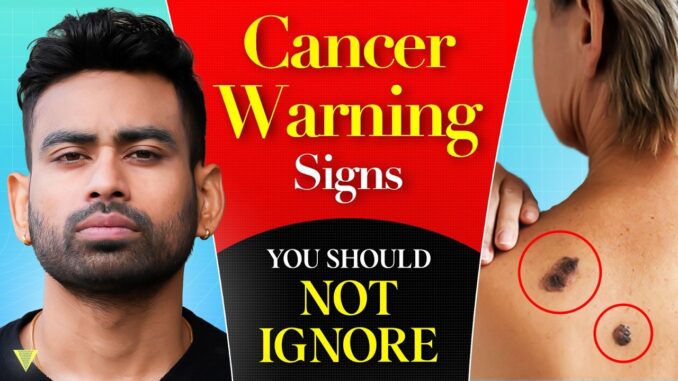
Cancer is a complex and multifaceted disease that affects the body in various ways. While cancer symptoms can vary depending on the type and location of the disease, there are several early signs that may indicate the presence of cancer. It’s important to note that many of these symptoms can also be caused by other, less severe conditions...CONTINUE READING THE FULL ARTICLES HERE
However, when any of these signs appear, it is crucial to consult a healthcare professional for a thorough evaluation and diagnosis. Early detection can significantly increase the chances of successful treatment.
1. Unexplained Weight Loss
One of the most common signs that may indicate the presence of cancer is unexplained weight loss. If you suddenly lose more than 5% of your body weight without changing your diet or exercise routine, it could be a red flag. Weight loss is particularly common in cancers such as those of the pancreas, stomach, esophagus, and lung. This weight loss occurs because the body starts to use more energy to fight the cancer, and sometimes the cancerous cells may also interfere with the body’s ability to process and absorb nutrients.
2. Persistent Pain
Pain that does not go away and is not linked to any obvious cause can be an indicator that something more serious is happening in the body. This could be localized pain, such as in the abdomen or joints, or pain that is more generalized. Cancers like bone cancer, brain tumors, or cancer that has metastasized (spread to other areas of the body) can cause persistent pain. Pain caused by cancer often becomes worse over time, and it may not respond well to common over-the-counter pain relievers. If you experience persistent pain that doesn’t subside, it is important to seek medical attention.
3. Changes in Skin Appearance
Changes in the skin can be another warning sign of cancer. For instance, the development of new moles or changes in the appearance of existing ones, such as changes in color, shape, or size, may signal skin cancer, particularly melanoma. Additionally, unexplained changes in the texture, color, or appearance of the skin can also indicate internal cancers that have spread to the skin. Some individuals may notice yellowing of the skin (jaundice), which could be a sign of liver cancer or pancreatic cancer. Skin changes should always be monitored, and any unusual growths or changes should be evaluated by a dermatologist or healthcare provider.
Other Symptoms to Watch For
In addition to these three major symptoms, there are several other signs that could indicate cancer, such as:
– **Fatigue**: A sudden and unexplained feeling of extreme tiredness or weakness that doesn’t improve with rest could be linked to cancer, especially blood cancers like leukemia or lymphoma.
– **Changes in Bowel or Urinary Habits**: Persistent changes, such as blood in stools, diarrhea, constipation, or a frequent urge to urinate, can indicate cancers of the digestive system, bladder, or prostate.
– **Persistent Cough or Hoarseness**: A cough that does not go away, especially if accompanied by blood or wheezing, can be a symptom of lung cancer or throat cancer.
– **Difficulty Swallowing or Loss of Appetite**: Unexplained difficulty swallowing, or a lack of appetite that lasts for an extended period, can be associated with cancers of the throat, esophagus, or stomach.
Conclusion
Cancer is a serious disease, and while the symptoms mentioned above may indicate cancer, it is essential to remember that these symptoms can also be related to other conditions. The key to improving cancer survival rates lies in early detection and intervention.
If you experience any of the symptoms discussed above, or if you notice anything unusual in your body that lasts for an extended period, seeking medical advice as soon as possible is crucial.
Regular check-ups and screenings for those with a family history of cancer or who are at higher risk can help catch the disease in its early stages when treatment options are most effective.
Kindly Follow Our WhatsApp Channel
Disclaimer: This content including advice provides generic information only. It is in no way a substitute for a qualified medical opinion. Always consult a specialist or your own doctor for more information. NEWSHOUR does not claim responsibility for this information.
